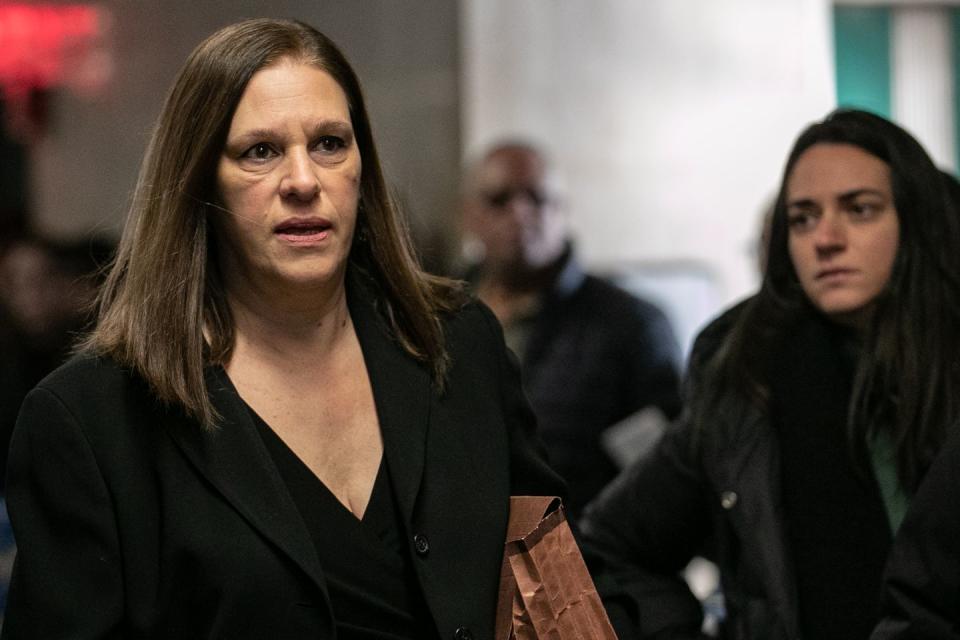No one should be above the law – and, as we’ve now seen, Harvey Weinstein certainly isn’t

“Twenty years ago, Harvey told me that when a woman says the sex wasn’t consensual, ‘Sometimes you have to write a check.’ Turns out sometimes you have to go to prison.”
Those were the words of Kim Masters, the editor-at-large of the Hollywood Reporter, on the conviction of Harvey Weinstein. The infamous film producer was found guilty of one count of third degree rape and one count of a first degree criminal sexual act in a Manhattan court on Monday. He was acquitted of the most serious counts of predatory sexual assault and one of first degree rape, but still faces up to 25 years in jail – and a further trial on four similar counts in Los Angeles.
However, after decades evading justice, protected by the culture of complicity he had built around him, the rapacious colossus of the #MeToo movement has finally been felled.
Masters was one of many journalists – including Ronan Farrow, and Pulitzer prize-winners Jodi Kantor and Megan Twohey – who worked with silence breakers to hold accountable a man that for so long had seemed untouchable. Speaking out about the crude and violent acts they suffered at the hands of Weinstein, 80 brave women risked it all to pursue justice, catalysing in their wake a movement of survivors whose public testimonies have shaken the very foundations of patriarchal power and privilege.
This trial was billed by the press as the ultimate test of the #MeToo movement. Lose, and all those hard-to-tell stories of harassment go down like a sinking ship. Win, and there is light at the end of the tunnel for women who have been disbelieved, blamed and dismissed so long. Now it's over, it is clear it marks not the middle or end of a global quest for survivors of sexual abuse, but the very beginning, the impact of which could change the way such cases are tried for generations to come.

Prosecutors Joan Illuzzi-Orbon and Meghan Hast played a bold game in the court room, calling 27 different witnesses to the stand over 12 days to paint the grotesque picture of the defendant’s serial violations to the jury. They did so successfully, despite a vicious defence outlined by Weinstein’s lawyers. His team were led by Donna Rotunno, an expert in sexual crime defence whose cross-examination was so aggressive, she induced a full-scale panic attack in one of the survivors.
Unusually, prosecutors chose two key witnesses who had continued to have close, sometimes sexual, contact with Weinstein following their attacks. Previous cases in which coercion and rape happened in a relationship where consensual sex also occurred would have been deemed far to complex to present to a jury if lawyers hoped to secure a guilty verdict. Contrary to popular myths, this kind of scenario is actually incredibly common - part of a web of confusion and control that abusers weave around their victims in order to keep them quiet, compliant, and doubting themselves.
The gamble paid off and the jury were convinced – a sign that age-old assumptions about sexual violence can be successfully debunked and challenged in court, and should be. As a result, we may well see prosecutors take on such cases in the future, despite decades of them being almost entirely ignored.

Then there is what this win symbolises for the enablers of abuse: the systems, organisations and people that turned the other cheek and allowed Weinstein’s behaviour to continue. This includes the media, many of whom tore chunks out of Weinstein’s silence breakers, blaming them for provoking him and assassinating their characters.
We’ve already seen these structures begin to grow weak at the joints since the #MeToo movement started – even in our own UK Parliament. In the last general election, survivors – including this writer – stood against MPs with unanswered allegations of sexual assault and harassment and forced them to step down. Now, the Commons has agreed to set up an independent body to investigate claims. No longer will parties be able to mark their own homework. Further evidence of cover-ups have been unmasked in the health service, the music industry, the fashion industry and retail. The problem is vast – but so has been the progress made towards revealing it.
However, there are many issues that remain untouched. This incredibly high-profile trial might have seen some women finally listened to, but the fact remains that most women around the world still struggle to be heard and treated with dignity, let alone bring their attackers to any sort of justice.
In England and Wales, men are raping women with seeming impunity. Despite the number of women reporting such crimes, conviction rates are at the lowest level in a decade: just 1.7 per cent of all cases are even prosecuted by the Crown Prosecution Service, let alone a successful conviction brought. Seemingly complex cases are unlikely to see court at all under the current criminal justice system, a radical overhaul of which is needed if any improvement is to be made.
And then there is rape culture, a social acceptance of sexual violence that continues to be perpetuated. Without education, and without men shouldering some of the burden of stamping out casual misogyny, it will be years before a jury is to see beyond myths and stereotypes exploited by canny defence teams.
No one should be above the law – and, as we’ve now seen, Harvey Weinstein certainly isn’t. But many still are. None of us are free until all of us are.
Jenn Selby is a journalist, campaigner, and activist for the Women’s Equality Party
You Might Also Like

 Yahoo News
Yahoo News 
